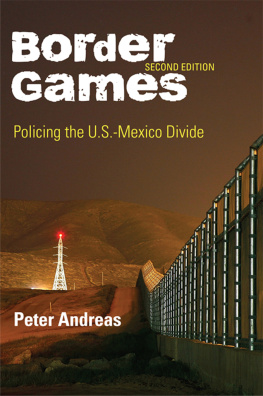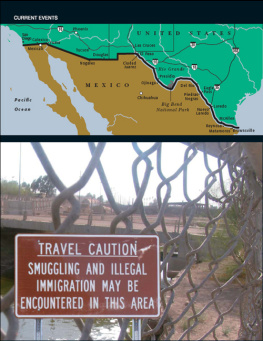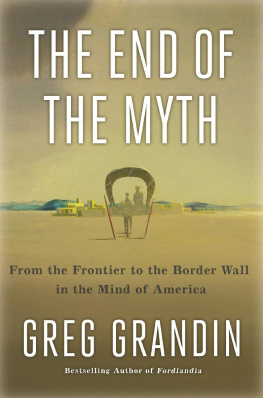Up Against the Wall
Also by Peter Laufer
Dreaming in Turtle: A Journey through the Passion, Profit, and Peril of Our Most Coveted Prehistoric Creatures
Organic: A Journalists Quest to Discover the Truth behind Food Labeling
The Elusive State of Jefferson: A Journey through the 51st State
Interviewing: The Oregon Method (editor)
Slow News: A Manifesto for the Critical News Consumer
No Animals Were Harmed: The Controversial Line between Entertainment and Abuse
Forbidden Creatures: Inside the World of Animal Smuggling and Exotic Pets
The Dangerous World of Butterflies: The Startling Subculture of Criminals, Collectors and Conservationists
Neon Nevada (with Sheila Swan Laufer)
Calexico! True Lives of the Borderlands
Hope Is a Tattered Flag (with Markos Kounalakis)
Mission Rejected: U.S. Soldiers Who Say No to Iraq
Exodus to Berlin: The Return of the Jews to Germany
Highlights of a Lowlife: The Autobiography of Milan Melvin (editor)
Shock and Awe: Responses to War (editor)
See You Later, Amigo! An American Border Tale (illustrated by Susan L. Roth)
Made in Mexico/Hecho en Mexico (illustrated by Susan L. Roth)
Wireless Etiquette: A Guide to the Changing World of Instant Communication
Safety and Security for Women Who Travel (with Sheila Swan Laufer)
Inside Talk Radio: Americas Voice or Just Hot Air
A Question of Consent: Innocence and Complicity in the Glen Ridge Rape Case
Nightmare Abroad: Stories of Americans Imprisoned in Foreign Lands
Iron Curtain Rising: A Personal Journey through the Changing Landscape of Eastern Europe
Anthem Press
An imprint of Wimbledon Publishing Company
www.anthempress.com
This edition first published in UK and USA 2020
by ANTHEM PRESS
7576 Blackfriars Road, London SE1 8HA, UK
or PO Box 9779, London SW19 7ZG, UK
and
244 Madison Ave #116, New York, NY 10016, USA
Copyright Peter Laufer 2020
The author asserts the moral right to be identified as the author of this work.
All rights reserved. Without limiting the rights under copyright reserved above, no part of this publication may be reproduced, stored or introduced into a retrieval system, or transmitted, in any form or by any means (electronic, mechanical, photocopying, recording or otherwise), without the prior written permission of both the copyright owner and the above publisher of this book.
British Library Cataloguing-in-Publication Data
A catalogue record for this book is available from the British Library.
Library of Congress Control Number: 2020940396
ISBN-13: 978-1-78527-524-1 (Hbk)
ISBN-10: 1-78527-524-0 (Hbk)
This title is also available as an e-book.
Photographs and maps by the author.
I am prejudiced to favor immigrants. How can I not be? My father came through Ellis Island. I have the page from the logbook where his arrival was recorded by the immigration officer on duty. He answered all the questions to the satisfaction of the inspector.
Whether a polygamist?
No.
Whether an anarchist?
No.
And Question 24:
Whether a person believes in or advocates the overthrow by force or violence of the Government of the United States or of all forms of law, or who disbelieves in or is opposed to organized government, or who advocates the assassination of public officials, or who advocates or teaches the unlawful destruction of property, or is a member of or affiliated with any organization entertaining and teaching disbelief in or opposition to organized government or which teaches the unlawful destruction of property, or who advocates or teaches the duty, necessity, or propriety of the unlawful assaulting or killing of any officer or officers, either of specific individuals or of officers in general, of the Government of the United States or of any other organized government because of his or their official character?
No, my father answered. It was 1923 and America was still more worried about immigrating anarchists from Middle Europe than Mexicans coming north.
Youre an American by birth, my father repeatedly reminded me. Im an American by choice.
Years ago, my wife Sheila and I spent days searching the bowels of the La Porte County courthouse in Indiana, finally finding her grandfathers naturalization papers.
It is my bona fide intention, he swore to the clerk of the La Porte County Court in 1913, to renounce forever all allegiance and fidelity to any foreign prince, potentate, state, or sovereignty, and particularly to Franz Josef, Emperor of Austria and Apostolic King of Hungary.
We secured the address of the house in what used to be called the Poletown section of La Porte where her mother lived before immigrating to California. Poletown was still on the wrong side of the tracks. The railroad bisects La Porte. South of the ornate courthouse, gracious Victorian mansions line Michigan Avenue under a canopy of well-established trees. But east of downtown and north across the tracks the boxy houses are humble, packed into the rusting factory and warehouse district. The wrong side of the tracks is the usual entry point in an American city for immigrants. And in La Porte, Poletown was filling up with Mexicans (along with other immigrants from south of the Rio Grande), Mexican restaurants and Mexican grocery stores.
Radical Change
In the summer of 2001, just weeks before the September 11 attacks, I wrote the following essay for the San Francisco Chronicle, a strident call to open the southern U.S. border to Mexicans who wish to come north:
We Americans work hard to keep Mexicans out of the United States, Mexicans who want to wash our dishes and pick our crops. Those crops need picking and those dishes need washing, so workers come north despite our best efforts. America ought to open and demilitarize our southern border immediately, welcome our Mexican neighbors to come and go with the ease of Canadian travelers to this country, and finally put an end to a sordid and shameful chapter in our national history. Not only is such a change in policy the proper moral and logical course of action for us to take, there will be no negative effects to the lives of most Americans.
The current border, from its Berlin Wall-like ghastliness against cities such as Tijuana, to the equally harsh deserts to the east, doesnt keep Mexicans from coming north and working here illegally. The heavily armed Border Patrol, equipped with the latest hi-tech magic, cant stop this surge of money-motivated migration. We all know that. Just look in the kitchen of your favorite restaurant, or along the roadside at one of the ad hoc hiring stations where desperate manual laborers congregate around all over the United States. Mexican workers are everywhere north of the border, especially in California. The only Mexicans who choose to come north illegally and dont are the unlucky who get caught. And many of them just try again moments after they are deported.
Since the passage of the 1996 Illegal Immigration Reform and Immigrant Responsibility Act, the U.S. Border Patrol has grown into the nations largest law enforcement agency, with nearly ten thousand officers. Nonetheless, our southern border remains porous.








